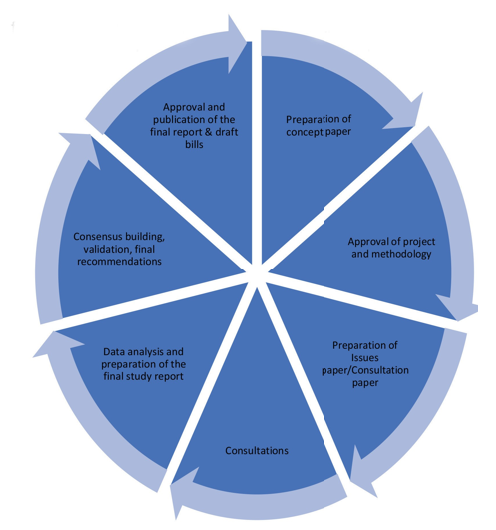The Commission does this work through the Law Reform department which is charged with;
(i) undertaking research and making recommendations for modernization, development and reform of the law;
(ii) advising government ministries, departments and agencies on law reform;
(iii) initiating proposals for new laws;
(iv) disseminating proposed bills or enacted laws;
(v) sensitizing the general public about laws; and
(vi) engaging the general public in the law making process.
The Law Reform Process
The law reform process is based on careful and thorough research. The Commission appreciates the importance of ensuring that its proposals for reform are grounded in reality.
The process of law reform starts with preparation of a concept paper and issues or consultation paper to guide the process. The concept paper explores the scope of the project, methodology to be adopted and identifies the key issues/ gaps in the existing law or area of the law. The issues or consultation paper provides a preliminary look at the issues surrounding the inquiry, the law in its current state and gaps, if any, and sets out provisional proposals for reform. These documents are intended to manage stakeholder expectations about the reform objectives, scope and terms of reference of a study.
Consultations are at the heart of any law reform process. During the law reform process, the Commission carries out consultations with relevant stakeholders on the subject matter under review. Consultations involve sending out issues’ papers for comments, meetings, seminars and workshops. Responses received are analysed and considered by the Commission for preparation of a final report with recommendations and in some cases legislative proposals.
The flow diagram below summarises the different processes for undertaking a law reform study:—

The law reform process entails examining laws, advocating and implementing changes in a legal system, usually with the aim of enhancing justice or efficiency and modernizing the law. It is done through the following steps

